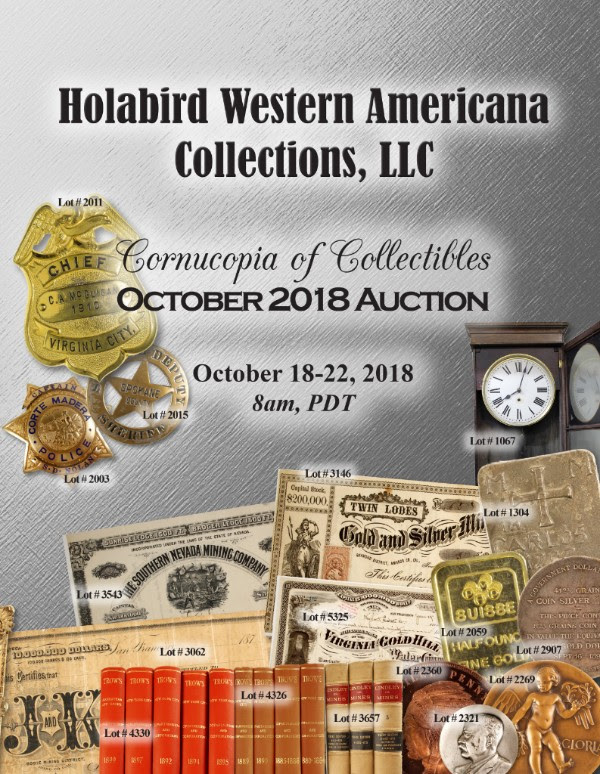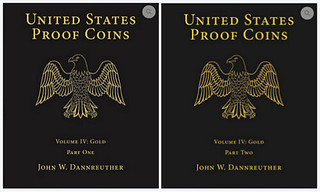
PREV ARTICLE
NEXT ARTICLE
FULL ISSUE
PREV FULL ISSUE
BOOK REVIEW: UNITED STATES PROOF COINS, VOLUME IVDealer and E-Sylum supporter Doug Winter of Portland, OR submitted this review of John Dannreuther's new book on U.S. proof gold. Thanks! -Editor UNITED STATES PROOF COINS, VOLUME IV BY JOHN DANNREUTHER: A REVIEW
I’ve known John Dannreuther for longer than I care to admit and for close to 30 (?) years, he’s been telling me about his work on an all-encompassing reference on US Proofs; a book that would once and for all bury the inaccuracies of the Breen book and make order out of this messy area of the hobby. I received JD’s new book(s) on Proof gold around a month ago and I’ve been treating them like I would a bottle of fine old Scotch. This isn’t a book that you sit and read in large gulps. It’s meant to sit on your shelf and get taken down a few times per week and—even then—read in short bursts. There have been very few books on US coins which I regard as “game changers.” Crosby’s book on Colonials is certainly one as is Penny Whimsy. In the area of specialized books, there are dozens of books which have had huge impact but only within their little areas of focus. I regard the new Dannreuther book as a game changer and a book against which all future books on US coins will be measured. The most important questions collectors will ask about Proofs are: “What is a Proof?” “How rare is a specific issue in Proof” and “What is it worth?” The Dannreuther books do a terrific job of answering the first two questions and wisely stay clear of the problems inherent with including values in reference works. I have always had an affinity for the extremely rare early Proofs (those struck from the early part of the 19 th century through the beginning of numismatics as we know it in the late 1850’s). The Dannreuther book does a superb job of explaining early Proofs, through diagnostics and numismatic history. This includes going the extra mile with the especially complex Classic Head proofs. The most difficult issues to determine their method of manufacture are gold dollars from the 1880’s. Even experts are often stumped by the difference between early business strikes (which appear fully prooflike) and genuine Proofs (which sometimes look like business strikes should). The Dannreuther book does a superb job of determining the differences between the two and through the use of clear images, shows the proper diagnostics for business strikes and Proofs. Another complex area of Proof gold are the Matte/Sandblast issues of 1908- 1915. The reason for the use of these new finishes is properly explained and diagnostics are provided. I would personally have liked the book to show large images of the differences in textures and colors for each year, as well as images which show what a “ruined” Matte Proof gold coin looks like after it has been conserved. The author makes mention of this on page 688 but some accompanying images would have been helpful. My only issue with this exceptional book is its bulk and size. The two volumes total 1031 pages and are housed in a slipcover. The sheer bulk of these books make using them somewhat difficult and I wonder if it wouldn’t have made more sense to have produced slimmer volumes which featured one denomination. United States Proof Coins Volume IV is an essential addition to any collector’s library and I believe it is a book that, like Crosby on Colonials, will retain its usefulness a century or more past its date of publication. The first three chapters are quite interesting and useful for all numismatists regardless of whether they collect or deal in the rare and valuable proof gold coins discussed in the rest of the two volumes. Chapter One is an "Introduction to Proof Coinage", followed by "Why and Where Were Proof and Master Coins Made?" and "How Were Proof and Master Coins Made?" The book has been well worth the decades-long wait, and we'll all look forward to subsequent volumes in the series. Printed on thick glossy paper, the color photos throughout are a dream, with quite a few close-ups revealing important diagnostic details. Measures of type rarity, date rarity and variety rarity are included for each piece. Up to a dozen or so significant examples are enumerated with detailed provenances. Mint records including die use and destruction documents have been consulted, as have the body of U.S. coin auction catalogs. JD has brought together all of the pertinent facts and thought through their implications for each piece. It's no wonder this book was 40 years in the making. The effort shows. And now every one of us can be the beneficiary of that work. See the earlier article for ordering information. -Editor To read the earlier E-Sylum article, see:  Wayne Homren, Editor The Numismatic Bibliomania Society is a non-profit organization promoting numismatic literature. See our web site at coinbooks.org. To submit items for publication in The E-Sylum, write to the Editor at this address: whomren@gmail.com To subscribe go to: https://my.binhost.com/lists/listinfo/esylum All Rights Reserved. NBS Home Page Contact the NBS webmaster 
|
